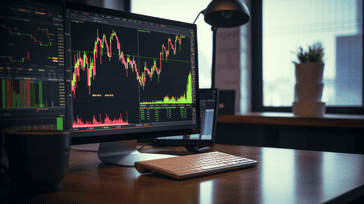Trading Strategies for Volatile Forex Markets

Foreign exchange (Forex) is a highly volatile market, with currency prices fluctuating rapidly. To navigate such a market, it's crucial to have effective trading strategies. This section will discuss some proven tactics and expert analysis to help you make informed decisions in currency trading and foreign exchange.
Key Takeaways:
- Having effective trading strategies is crucial in the volatile Forex market.
- Forex trading involves buying and selling currencies.
- Currency prices in the Forex market fluctuate rapidly.
- Expert analysis and proven tactics can help navigate the volatile Forex market.
- Understanding market trends and choosing the right broker are also essential for successful currency trading.
Understanding the Forex Market
Before diving into the world of Forex trading, it's important to have a basic understanding of the Forex Market and how it operates.
The Forex Market, also known as the foreign exchange market, is a decentralized global marketplace where traders can buy and sell currencies. With an average daily turnover of $5.3 trillion, it's the largest and most liquid financial market in the world.(SEO: Forex Market)
The Forex Market is open 24 hours a day, five days a week. Trading starts on Monday morning in Wellington, New Zealand, and ends on Friday evening in New York. Forex traders can participate in the market through forex trading platforms, which act as intermediaries between buyers and sellers.(SEO: forex trading platform)
The Key Players in the Forex Market
The Forex Market is dominated by five major players: central banks, investment banks, corporations, hedge funds, and retail traders. Central banks can influence the Forex Market through monetary policy decisions, while investment banks and corporations use the market for hedging purposes. Hedge funds and retail traders aim to profit from currency fluctuations.(SEO: Forex Market)
The Role of Forex Trading Platforms
Forex trading platforms play a crucial role in facilitating transactions between buyers and sellers in the Forex Market. They provide traders with access to live currency prices, charts, technical analysis tools, and news feeds. Some popular forex trading platforms include MetaTrader 4, cTrader, and TradingView.(SEO: forex trading platform)
Now that you have a basic understanding of the Forex Market and its key players, let's move on to analyzing the market in the next section.
Analyzing the Forex Market

When it comes to trading in the Forex Market, accurate analysis is a crucial element for making informed trading decisions. Forex market analysis allows traders to identify potential market trends, changes in currency prices, and market volatility, which can help traders to maximize their profits and minimize their risks.
Understanding Forex Market Analysis
Forex market analysis is broadly classified into two categories: technical analysis and fundamental analysis.
- Technical Analysis: Traders who use technical analysis to analyze the Forex Market rely on past market data and statistics to identify trading opportunities. They use charts and technical indicators to determine trends and patterns that may indicate future market movements.
- Fundamental Analysis: This type of analysis looks at the underlying economic, financial, and geopolitical factors that may affect currency prices. Fundamental analysts study news events, economic indicators, and government policies that may impact the currency market.
It's important to note that both technical and fundamental analysis play a crucial role in understanding the Forex Market, and traders often use a combination of both techniques to make informed trading decisions.
Identifying Forex Market Trends
Identifying trends is a crucial part of analyzing the Forex Market. Traders look for trends in currency prices, trading volume, and market volatility to identify potential opportunities for profit.
| Upward trend | Downward trend |
|---|---|
| Occurs when the price of a currency pair is consistently increasing over a period of time. | Occurs when the price of a currency pair is consistently decreasing over a period of time. |
| Traders may look for buying opportunities when a currency pair is in an upward trend. | Traders may look for selling opportunities when a currency pair is in a downward trend. |
It is worth noting that market trends are not always predictable, and traders should use caution when interpreting market trends and making trading decisions based on them.
By effectively analyzing the Forex Market, traders can gain valuable insights into potential trading opportunities. Technical and fundamental analysis can help traders identify market trends and patterns, which can be used to make informed trading decisions.
Choosing the Right Forex Broker
Choosing the right forex broker can make or break your trading success. With so many options available, it's important to do your research and consider the following factors:
- Regulations: Ensure that the broker you choose is regulated by a reputable authority, such as the National Futures Association (NFA) or the Financial Conduct Authority (FCA).
- Trading Platforms: Look for a broker that offers a user-friendly trading platform with advanced features, such as charting and analysis tools.
- Customer Support: Choose a broker that provides excellent customer support and is available 24/7 to assist you with any issues or questions.
- Account Types: Check the account types offered by the broker and ensure that they meet your trading needs.
- Fees: Consider the fees charged by the broker, including spreads, commissions, and any other charges.
Once you have narrowed down your options, it's important to compare the brokers to make an informed decision. Consider creating a table to compare the brokers based on the factors above, ensuring that you choose the broker that best meets your trading needs.
Effective Forex Trading Strategies

When it comes to currency trading in the volatile Forex Market, having effective trading strategies can help you make informed decisions and mitigate risk. Here are some proven strategies to consider:
- Trend following: This strategy involves analyzing market trends and identifying the direction of the market to make trades. Traders using this strategy will typically buy when the market is trending upwards and sell when it is trending downwards.
- Breakout trading: This strategy focuses on identifying key levels of support and resistance. Traders using this strategy will buy when the price breaks above resistance levels and sell when the price breaks below support levels.
- Range trading: This strategy involves identifying ranges in which a currency pair is trading and buying at the bottom of the range and selling at the top of the range. This strategy is often used in sideways markets where there is no clear trend.
Example of Trend Following Strategy:
| Date | Currency Pair | Action |
|---|---|---|
| June 1, 2021 | USD/JPY | Buy |
| June 15, 2021 | USD/JPY | Sell |
Remember, there is no one-size-fits-all strategy for trading in the Forex Market. It's essential to understand your risk tolerance and trading style before implementing any strategy. It's also important to constantly analyze the market and adjust your strategies accordingly.
“Successful traders always follow the line of least resistance, and the line of least resistance is always the direction of the trend.” - Jesse Livermore
By utilizing effective trading strategies, you can improve your chances of success in currency trading. Keep in mind that even with the best strategies in place, there is still risk involved in Forex trading. Always practice proper risk management techniques to protect your investments.
Utilizing Forex Signals
When it comes to successful Forex trading, using forex signals can be a valuable tool to guide your decisions. Forex signals are alerts sent by signal providers, usually experienced traders or automated systems, that indicate potential trading opportunities.
There are various types of forex signals available, including:
- Position signals: Indicating when to open or close a position
- Technical signals: Based on technical analysis of the market
- Fundamental signals: Based on economic and geopolitical news events
It's important to find reliable forex signal providers that have a proven track record of accuracy. You can subscribe to signal services online or find free signal providers on social media or trading forums.
Once you receive signals, it's essential to interpret them properly. Look for signals that align with your trading strategy and use indicators, such as trend lines and support and resistance levels, to confirm the signal's strength.
It's also crucial to incorporate forex signals into your overall trading strategy. Don't rely solely on signals to make trading decisions but use them as a complementary tool to your analysis and research.
"Forex signals can offer valuable insights into the market, but they should not be the only factor driving your trades."
By utilizing forex signals, you can potentially increase your chances of success in the volatile Forex Market. However, it's crucial to find reliable providers, interpret signals properly, and incorporate them into your overall trading strategy.
Staying Updated with Forex News

Staying up to date with the latest forex news is essential for making informed trading decisions. Keeping an eye on economic indicators, news events, and market trends can help you anticipate changes and adjust your strategy accordingly.
There are several reliable sources of forex news, such as Bloomberg, Reuters, and CNBC. These sources provide up-to-the-minute coverage of market developments, expert analysis, and insights into key trends shaping the forex market.
"The most successful forex traders are those who stay informed and adapt to changing market conditions." - John Smith, forex expert
In addition to these major news outlets, many forex brokers offer their own news feeds and analysis. These sources can be particularly valuable for traders, as they often provide tailored insights and perspectives.
When interpreting forex news, it's essential to take a critical approach and carefully evaluate sources. Keep in mind that news events can have a significant impact on the forex market, but their effects can be unpredictable and short-lived.
By staying up to date with forex news and market events, you can stay ahead of the curve and make more informed trading decisions.
Risk Management in Forex Trading
Forex trading carries inherent risks that can lead to potential losses. However, with effective risk management techniques, traders can minimize those risks and protect their investments.
Understanding Risk in Forex Trading
Before implementing risk management techniques, it's important to understand the various risks associated with forex trading. These include market risk, credit risk, counterparty risk, and operational risk.
Market risk is the risk of losses resulting from changes in market prices. Credit risk is the risk of losses resulting from a counterparty's failure to fulfill their financial obligations. Counterparty risk is the risk of losses resulting from the default of a financial institution. Operational risk is the risk of losses resulting from inadequate or failed internal processes, people, and systems.
Effective Risk Management Techniques
Effective risk management involves identifying potential risks, assessing their likelihood and impact, and implementing strategies to mitigate them.
One common risk management technique in forex trading is setting stop-loss orders. A stop-loss order is an instruction to automatically close a position when the price reaches a certain level, limiting potential losses.
Another technique is position sizing, which involves determining the appropriate amount of capital to risk on each trade based on the size of the trading account and the level of risk involved.
Diversification is also a key risk management technique. Spreading investments across different currency pairs, asset classes, and markets can help to minimize potential losses in the event of unfavorable market conditions.
Conclusion
Effective risk management is essential for successful forex trading. By understanding the various risks involved and implementing risk management techniques such as stop-loss orders, position sizing, and diversification, traders can minimize potential losses and protect their investments.
Conclusion
In conclusion, the Forex Market is a volatile arena that requires traders to adopt effective trading strategies, sound analysis, and risk management techniques for success. By developing a solid understanding of the market and choosing the right forex broker, you can navigate the market with ease and confidence.
Staying Updated with News and Signals
Staying up to date with the latest forex news and signals is crucial for making informed trading decisions. Keep tabs on reliable sources and understand how to interpret news events and economic indicators to gain an edge in the market. Incorporating reliable signals into your trading strategy can also help guide your decisions and increase your chances of success.
Managing Risk in Forex Trading
Managing risk effectively is key to protecting your investments in forex trading. Implement risk management techniques like setting stop-loss orders, practicing position sizing, and diversification to minimize potential losses and maximize gains.
Overall, navigating the Forex Market is a challenging but rewarding endeavor. By using the right tools and strategies, you can improve your chances of success and achieve your trading goals. Stay informed, stay focused, and remember to always practice prudent risk management.
FAQ
What are some effective trading strategies for navigating the volatile Forex Market?
There are several effective trading strategies for navigating the volatile Forex Market. Some popular strategies include trend following, breakout trading, and range trading. These strategies involve analyzing market trends, identifying key levels of support and resistance, and making informed trading decisions based on price movements.
What are the basics of the Forex Market?
The Forex Market is where currencies are bought and sold. It is the largest financial market in the world, with trillions of dollars being traded daily. Key players in the Forex Market include central banks, commercial banks, multinational corporations, institutional investors, and individual traders. Forex trading platforms act as intermediaries, facilitating transactions between buyers and sellers.
How can I analyze the Forex Market?
Analyzing the Forex Market involves using various techniques such as technical analysis and fundamental analysis. Technical analysis focuses on studying historical price patterns, charts, and indicators to identify trends and make predictions about future price movements. Fundamental analysis involves analyzing economic data, news events, and geopolitical factors to assess the overall health of a currency and its potential impact on the market.
What should I consider when choosing a forex broker?
When choosing a forex broker, there are several factors to consider. These include regulation and licensing, trading platforms and tools offered, fees and commissions, customer support, educational resources, and the overall reputation and reliability of the broker. It is important to choose a broker that aligns with your trading goals and provides a secure and transparent trading environment.
What are some effective forex trading strategies?
There are various effective forex trading strategies that can be employed in volatile market conditions. Some popular strategies include trend following, breakout trading, and range trading. Trend following involves identifying and following the direction of a dominant trend, while breakout trading focuses on capturing price movements when a currency breaks out of a defined range. Range trading involves identifying key levels of support and resistance and trading within that range.
How can I utilize forex signals in my trading?
Forex signals can be a valuable tool in guiding your trading decisions. These signals are generated by professional traders or automated systems and provide information about potential trading opportunities. To utilize forex signals, you can subscribe to a reliable signal provider, receive the signals via email or a dedicated platform, and incorporate them into your trading strategy. It is important to understand how to interpret the signals and consider them alongside your own analysis and risk management strategy.
How can I stay updated with forex news?
Staying updated with forex news is crucial for making informed trading decisions. You can stay updated by following reputable financial news sources, subscribing to economic calendars, and utilizing news aggregators. It is important to understand how to interpret news events and economic indicators, as they can have a significant impact on currency movements. By staying informed, you can align your trading strategy with market events and potential opportunities.
How can I manage risk in forex trading?
Risk management is essential in forex trading to protect your investments. Some key risk management techniques include setting stop-loss orders to limit potential losses, proper position sizing to manage exposure, and diversification to spread risk across different currency pairs and asset classes. It is important to have a clear risk management plan in place and to adhere to it consistently. Additionally, continuous monitoring of trades and adjusting risk parameters as market conditions change can help manage risk effectively.
How can I navigate the volatile Forex Market?
Navigating the volatile Forex Market requires a combination of effective trading strategies, analysis, and risk management. By understanding the basics of the market, choosing a reliable forex broker, analyzing market trends, utilizing forex signals, staying updated with news events, and managing risk effectively, you can improve your chances of success in currency trading.
